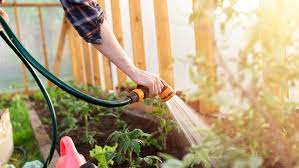If you’re like us, you love spending time in your garden. But with great joy comes great responsibility, and one of those responsibilities is watering your plants efficiently. Not only does this save water, but it also saves you time and money.
In this article, we’ll share five tips for watering your garden efficiently.
Assess Your Garden’s Water Needs
Before we start watering our garden, we need to assess its water needs. This will help us determine how much water our garden requires and how often we should water it. Here are a few things to consider when assessing your garden’s water needs:
- The type of plants you have – Different plants have different water requirements. For example, succulents require less water than tropical plants.
- The soil type – Sandy soil drains water quickly, while clay soil retains water for longer periods.
- The climate – Hot and dry climates require more frequent watering than cooler and more humid climates.
- The time of year – Plants require more water during the hot summer months than in the cooler fall and winter months.
Once we have a good understanding of our garden’s water needs, we can create a watering schedule that is tailored to our specific garden. This will help us avoid over or under-watering, which can damage our plants and waste water.
Choose the Right Irrigation System
When it comes to watering your garden, choosing the right irrigation system can make a big difference in terms of efficiency and water conservation. Here are some options to consider:
Drip Irrigation
Drip irrigation is a system that delivers water directly to the roots of your plants, which can help reduce water waste and ensure that your plants get the moisture they need. This system involves running tubing along the base of your plants and using emitters to deliver water slowly and consistently. Drip irrigation is a great option for gardens with plants that have different watering needs, as you can adjust the flow rate for each individual plant.
Soaker Hoses
Soaker hoses are another option for efficient watering. These hoses are made with tiny holes that allow water to seep out slowly, delivering moisture directly to the soil. Soaker hoses are easy to install and can be used in a variety of garden configurations. They are especially useful for gardens with plants that have similar watering needs.
Sprinkler Systems
Sprinkler systems are a popular choice for watering large areas of a garden. These systems use a series of sprinkler heads to deliver water evenly across the garden. While sprinkler systems can be efficient, they can also waste water if not used properly. Be sure to choose a system with adjustable heads so you can control the flow of water and avoid watering areas that don’t need it.
Choosing the right irrigation system for your garden can help you save water and keep your plants healthy. Consider the size and layout of your garden, as well as the watering needs of your plants, when deciding which system to use.
Water at the Right Time
One of the most important factors in watering your garden efficiently is timing. Watering at the right time can help reduce water loss due to evaporation and ensure that your plants receive the water they need to thrive.
So, when is the best time to water your garden? We recommend watering early in the morning or late in the evening when the temperatures are cooler and the sun is not as strong. This will help prevent water from evaporating too quickly and ensure that your plants have enough time to absorb the water before the heat of the day sets in.
Watering during the middle of the day when the sun is at its strongest can lead to water loss due to evaporation and can also damage your plants by scorching their leaves. It’s best to avoid watering during this time if possible.
Of course, there may be times when you need to water your garden during the day, such as during a heatwave or drought. In these cases, try to water as close to the ground as possible to reduce evaporation and water loss. You can also use a shade cloth or other type of cover to help protect your plants from the sun’s rays.
By watering at the right time, you can help ensure that your garden stays healthy and vibrant while also conserving water.
Mulch Your Garden
One of the easiest ways to water your garden efficiently is to mulch your garden. Mulching helps to keep the soil moist and cool, which means that you won’t need to water your plants as often. Mulching also helps to prevent weeds from growing, which can compete with your plants for water and nutrients.
There are many different types of mulch that you can use in your garden, including organic and inorganic options. Organic mulches, such as straw, leaves, and grass clippings, are great for improving soil quality and retaining moisture. Inorganic mulches, such as pebbles and rocks, are great for preventing erosion and adding aesthetic appeal to your garden.
When applying mulch to your garden, be sure to spread it evenly around your plants. This will help to prevent water from evaporating too quickly and will ensure that all of your plants receive the moisture they need. You can also use a drip irrigation system under the mulch to help water your plants more efficiently.
Mulching your garden is a simple and effective way to conserve water and keep your plants healthy. By using the right type of mulch and applying it correctly, we can create a beautiful and sustainable garden that requires less water and maintenance.
